The Poetic Edda: A Study Guide
The Speech of the Masked One

[PREVIOUS][MAIN][NEXT]
[HOME]
MS No. 2365 4to [R]
AM 748 I 4to [A]
Normalized Text:
Scöll heitir úlfr,
er fylgir enu skírleita goði
til varna viðar,
en annarr Hati,
hann er Hróðvitnis sonr,
sá skal fyr heiða brúði himins.
Sköll heitir úlfr,
er fylgir hinv skírleita goði
til vavna viðar,
en annarr Hati,
er Hróðvitnis svn,
sá skal fyr heiða brúði himins.
39. Sköll heitir úlfr,
er fylgir inu skírleita goði
til varna viðar,
en annarr Hati,
hann er Hróðvitnis sonr,
sá skal fyr heiða brúði himins.
in Icelandic Poetry
“The Song of Grimnir”
The Yale Magazine, Vol. 16
“The Song of Grimner”
XXXIX.
Skoller, the direful wolf whose rage
Devours the monuments of age,
Pursues the God whose eye sublime
Daily surveys each terrene clime.
Before the gentle Queen of heaven,
To Hater[1] 'tis forever
given
Still to advance --- the same we're told,
From Herodvitner sprung of old.
[1]
HATER, another wolf who is the precursor of the Moon.
The wolf, whose eager eye followeth the sun,
The brilliant god, unto the girding sea,
Is Skaull; but Hati, great Hrodvitner's son,
Goeth before the softly shining moon.
in Edda Sæmundar Hinns Frôða
“The Lay of Grimnir”
in Corpus Poeticum Boreale
“The Sayings of the Hooded One”
39. Sköll the wolf is named,
that the fair-faced goddess
to the ocean chases;
another Hati hight,
he is Hrodvitnir’s son;
he the bright maid of heaven shall precede.
Skulk is the name of the wolf that follows
the fair-faced Goddess to ....[1]
But the other is called Hastener; he is the son of the Great Beast: he has to
run before the bright bride of Heaven. . .
[1]
The untranslated words here are varna viðr.
in Edda Saemundar
“The Sayings of Grimnir”
in The Poetic Edda
“Grimnismol: The Ballad of Grimnir”
39. Skoll is the wolf called who hunts the bright sun-goddess
even to the Sheltering grove ;
a second fares, Moon-hater, offspring of Fenrir
in front of that fair bride of heaven.[1]
[1]
39. Skoll, Moon-hater, wolves of darkness ; see Vsp. st. 40. Fenrir, the great
Wolf who swallows Odin ; see Vsp. st. 53.
39. Skoll is the wolf that to Ironwood
Follows the glittering god,
And the son of Hrothvitnir, Hati, awaits
The burning bride of heaven.
in The Poetic Edda
“The Lay of Grimnir”
in The Elder Edda
“The Lay of Grimnir”
40. Skoll the wolf, in the sky dogs him
to the warding woods;[1]
but Hati the others, Hrothvitnir's son,
follows the fair orb too.
[1]
This passage, as well as the following, is of doubtful meaning.
Skoll the wolf who shall scare the Moon
Till he flies to the Wood-of-Woe:
Hati the wolf, Hrodvitnir's kin,
Who shall pursue the Sun.
in The Poetic Edda
“Grimnir’s Sayings”
in The Poetic Edda, Vol. III: Mythological Poems
“The Lay of Grimnir”
who pursues the shining god
to the protecting woods;
and another is Hati, he is Hrodvitnir's son,*
who chases the bright bride of heaven.
39. Crafty the wolf is called,
who accompanies the fair-faced goddess
to Wardens’ Wood,
while another called Hater
—he is High Famed Wolf’s son—
has to precede the bright bride of heaven.
The Elder Edda: A Book of Viking Lore
'The Lay of Grimnir"
39. ‘Spite’s the name of the wolf who chases
the fair-faced god [Moon]
to the protection of the woods;
a second is Hate, Famed Wolf’s [Fenrir’s] son,
who is after the bright bride of heaven.
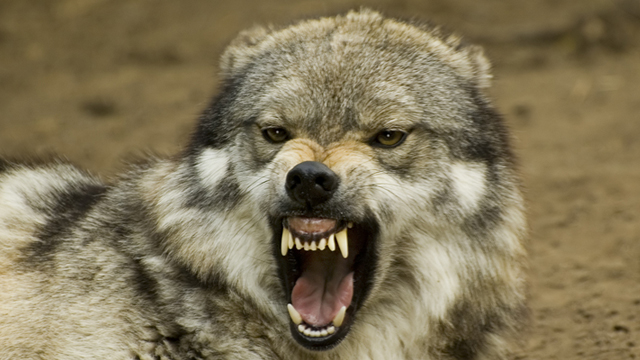
[HOME][GRÍMNISMÁL]
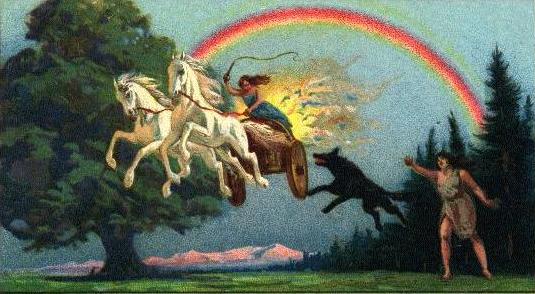
COMMENTARY
Like Dogs Chasing Cars
|
Þá mælti Gangleri: "Skjótt ferr sólin ok nær svá sem hon sé hrædd, ok eigi mundi hon þá meir hvata göngunni at hon hræddisk bana sinn."
Þá svarar Hár: "Eigi er þat undarligt at hon fari ákafliga. Nær gengr sá er hana sœkir, ok øngan útveg á hon nema renna undan." Þá mælti Gangleri: "Hverr er sá er henni gerir þann ómaka?" Hár segir: "Þat eru tveir úlfar, ok heitir sá er eptir henni
ferr Sköll. Hann hræðisk hon, ok hann mun taka hana. En sá
heitir Hati Hróðvitnisson er fyrir henni hleypr, ok vill hann
taka tunglit, ok svá mun verða." Hár segir: "Gýgr ein býr fyrir [au]stan Miðgarð í þeim skógi
er [Já]rnviðr heitir. Í þeim skógi byggja þær tröllkonur er
Jár[n]viðjur heita. In gamla gýgr fœðir at sonum marga jötna ok
alla í vargs líkjum, ok þaðan af er[u] komnir þessir úlfar. Ok
svá er sagt at af ættinni verðr sá einn mátkastr er kallaðr er
Mánagarmr. Hann fyllisk með fjörvi allra þeira manna er deyja,
ok hann gleypir tu |
XII. Then said Gangleri: "The sun fares swiftly, and almost as if she were afraid: she could not hasten her course any the more if she feared her destruction." Then Hárr made answer: "It is no marvel that she hastens furiously: close cometh he that seeks her, and she has no escape save to run away." Then said Gangleri: "Who is he that causes her this disquiet?" Hárr replied: "It is two wolves; and he that runs after her is called Skoll; she fears him, and he shall take her. But he that leaps before her is called Hati Hródvitnisson. He is eager to seize the moon; and so it must be." Then said Gangleri: "What is the race of the wolves?" Hárr answered: "A witch dwells to the east of Midgard, in the forest called Ironwood: in that wood dwell the troll-women, who are known as Ironwood-Women. The old witch bears many giants for sons, and all in the shape of wolves; and from this source are these wolves sprung. The saying runs thus: from this race shall come one that shall be mightiest of all, he that is named Mánagarm; he shall be filled with the flesh of all those men that die, and he shall swallow the moon, and sprinkle with blood the heavens and all the lair; thereof-shall the sun lose her shining, and the winds in that day shall be unquiet and roar on every side. |
The names Sköll and Hati are transparent in meaning:
sköll, f. [cp. skval, skjall], mockery, loud laughter (Cleasby/Vigfusson Dictionary)
hati, a, m. one who shuns; from hata, [Ulf. hatan =Anglo-Saxon hatjan; English hate; OHG. hazen; German hassen; Danish hade; Swedish hata] :-- to hate. (Cleasby/Vigfusson Dictionary)
The author of Gylfaginning 12 refers to the wolf Hati as Hati Hródvitnir's son. In Lokasenna 39 [R], Hróðvitnir is used as a name of Fenrir, and in Hymiskviða 11, the one-handed god Týr is called Hróðrs andskoti, "Hróð's adversary." Thus, Sköll and Hati are most likely sons of Loki's son, Fenrir (unless we take Fenrir as a generic term for 'wolf' as some scholars are wont to do).
An allusion to this myth occurs in Hrafnagaldur Óðinns 23.
|
Rann með röstum, |
Ran along the eddies of Rindur's plains the Fenrir's tired fodder-lard (food); the gods left the feast and saluted Hroptur (Odin) and Frigg, as Hrímfaxi ascended. |
Because of textual problems in the first half stanza, an exact translation is not possible. Several solutions have been suggested:
1. röstum. Röst can mean "a current or stream in the ocean; eddy, whirlpool".2. móður can be read as a genitive of "móðir" (mother's). This can be joined with "Rindar", giving a meaning "of the mother of Rindur". She may be the Sun, in which case "rastir Rindar móður" could mean "the paths of the Sun".
3. móðir may be the nominative of "móðir" (mother). "The mother of Rindur", yielding "The mother of Rindur ran along the paths/eddies."
4. In lines 3-4, "fóðurlarður fenris" may be seen as a kenning for the Sun. The Sun is the wolf's dinner.
5. "fenris vellir" may be a kenning for "sky, heaven", if the wolf is seen as chasing the sun every day. If so, one would need to assume a "dovetailing" or a "double-duty" kenning, where "fóðurlarður fenris" = the wolf's dinner = SUN; and "the wolf's plains" = SKY.
6. "rastir Rindar valla" (chosen here) = "the eddies of Rindur's plains" = the swirling seas in the West (at sunset). Assuming that "Rindar vellir" equals "Vestursalir" ("western-halls")
7. Bugge suggests: "Fenris fóður (i.e. sun) rann með röstum Rindar (i.e. westwards) ... sem móðir Jarðar (Night) fór Hrímfaxa (i.e. by means of Hrímfaxi).
Whatever the exact meaning, it seems obvious that the stanza describes the setting of the Sun in the West, as Night ascends in the East. Night rides the horse Hrimfaxi. In the previous stanza, the advent of twilight signals the end of the gods' banquet. In the following verse, Dag (Day) and Sol (Sun) appear on the horizon at dawn. Here the gods take leave of their hosts (Óðinn and Frigg) as night falls.
Little is known about the obscure goddess Rind. Closely associated with the sun, she may be identifical to Sól's daughter, Sunna, who will assume her mother's role after Ragnarök, once the wolf catches and devours her (Vafþrúðnismál 47). With Rind, Odin fathers Vali, Baldur's avenger. In Baldurs Draumar 11, we learn that "Rind bears Vali in western halls" (Rindur ber Vála í vestursölum). In Lokasenna 34, Loki says that Njörd was sent east from Vanaheim as a hostage, indicating that Vanaheim is located in the west. This makes it likely that Rind is a member of the Vanir tribe. Odin had a difficult time obtaining her favor, and had to resort to witchcraft. A verse by the skald Kormak preserved in Skaldskaparmál 2, informs us that Odin-Yggr "worked seið on Rind," (seið Yggr til Rindar). Based on Saxo's account of Rinda in Book 3 of his Gesta Danorum, Rind may be identified with "Billing's maiden" (Billings mær) of Hávamál 97 (see below). Similarly, Odin makes three journeys to her, and is rejected three times, once having encountered miltiary force, before finally having his way with her.
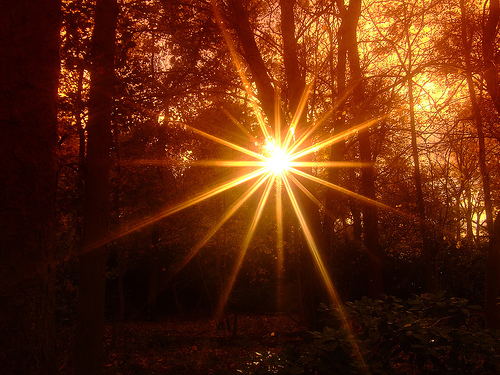
Varna Viðr: Into the Woods
Surprisingly, varna viðr was initially interpreted as the sea. This is undoubtedly based on the first Latin translation of the poem, published in 1787, in Edda Saemundar hinns Fróda: Edda rhythmica seu antiquior, vulgo Saemundina Dicta, where varna viðr was rendered as: ad cingens (terrerum) mare, "the sea, encircling (earth)." The wide influence of this volume can be seen in the early translations of Grímnismál:
1797 Cottle: terrene clime
1818 Majer: umgebenden Meer, '"surrounding sea"
1841 du Puget: l'Ocean dont les bras étreignent terre, "the Ocean whose arms embrace the earth"
1851 C.P: girding sea
1856 de los Rios: el Océano, cuyos brazos estrechan á la tierra, "the ocean whose arms embrace the earth"
1866 Thorpe: the ocean
1874 Simrock: schützende flut, "protective flood"
1874 Jordan: gürtenden Weltmeer, "girdling world-sea"
1883 Vigfusson: untranslated
In the last quarter of the 19th century, the phrase varna viðr began to be interpreted as a forest [the literal meaning of viðr] and translated more accurately, although the translators remained uncertain whether it was a proper name or a descriptive phrase:
1871 Bergmann Forêt-de-Défense, "Forest-of-Defense"
1908 Bray: "sheltering grove"
1923 Bellows: "Ironwood"
1962 Hollander: "warding woods"
1967 Terry: "Wood-of-Woe"
2011 Orchard: "protection of the woods"
2011 Dronke: "Wardens' Woods"
Based on the context of this stanza, the wolves Sköll and Hati chase the sun and moon all the way to varna viðr daily. Thus this forest must be located at the far end of the world, and specifically to the west, the direction of the setting sun. Henry Bellows reinterpreted the phrase as 'Ironwood' which must be incorrect, as Völuspá 40 informs us that the Ironwood is located in the east:
|
Austr sat in aldna |
The old one sat east in the Ironwood and there gave birth to Fenrir's kin; From all of them a certian one shall emerge the moon's 'pitchfork' in troll's guise. |
In Lokasenna 39 [R], Hróðvitnir is used as name of Fenrir. Speaking to Loki, Tyr says:
|
"Handar em ek vanr, |
"I miss my hand and you Hróðvitnir (the Famed Wolf) both suffer bitter loss; the wolf is not well, but must in chains await Ragnarök" |
Thus, while Völuspá informs us that an old hag (Aurboda) sits east in the Ironwood breeding Fenris kindir, "kin of Fenrir" (i.e. wolves), Grímnismál 39 tells us that Fenrir's (Hróðvitnir's) children chase Sol and Mani daily to the varna viðr. Following the course of the sun, their journey begins on the eastern horizon every day, and ends on the western horizon.
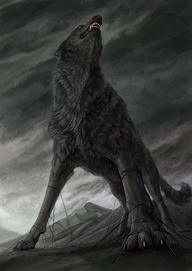 |
The Ironwood, inhabited by Fenrir's children, is explicitly located in the east, the direction of the rising sun. Logically, Fenrir's sons, Sköll and Hati, begin their daily trek here. Grímnismál 39 informs us that their chase ends at varna viðr, when Sol escapes below the horizon. Thus varna viðr must be located in the far west, the direction of the setting sun.
As noted above, varna viðr can mean "the protecting wood". The designation is fitting, since there, Sol escapes the fangs of Fenrir's children daily. The stanza doesn't tell us how she manages to do this, only the place where it happens. In that regard, we should remember that the phrase varna viðr can also be interpreted as a proper name, meaning "the forest of the Varns" or "the forest of the protectors," [fx: Ursula Dronke's "Wardens' Woods"]. Could it be that Sol and Mani had help fending off their attackers?
In the Old English poem Widsith, a travelling scop names a great number of ancient tribes and their leaders, some real and some mythic in origin. Of interest to the current investigation, the scop names Billing as commander of the Varns, an otherwise unknown Germanic tribe:
Widsith, Exeter Book 320, 7: Billing [veold] Vernum, "Billing ruled the Varns" (written in Old English)
The mythic sources know of a being named Billing. Billing occurs as the name of a dwarf in Völuspá's famous dwarf-list (Hauksbók 13), and as the father of a mysterious maiden whom Odin seduces in Hávamál 96-102 (Andy Orchard translation):|
Þat ek þá reynda, |
96. I found out when I sat in the reeds, and waited for my best loved girl; body and soul was that wise lass to me, and yet I couldn't have her. |
|
Billings mey |
97. Billing girl I found on the bed, sun-bright, all asleep; a nobleman's joys were as nothing to me unless I could be with that body. |
|
"Auk nær aftni
|
98. "Again at evening must you, Odin, return, if you will woo a woman; everything's lost, unless we alone know our wickedness together." |
|
Aftr ek hvarf |
99. Back I turned, intending love, back from certian delight; I really thought that I should have her whole lust, and her love. |
|
Svá kom ek næst, |
100. When next I came there handy stood a war-band all awake; with burning torches and wood born high: my wretched path was revealed. |
|
Auk nær morgni, |
101. Close to morning I came again, and I saw the hall-band asleep: I found a bitch tied up on the bed of that wonderous woman. |
|
Mörg er góð mær, |
102. Many a fine lass, once you know her well, proves fickle of heart towards men; I found that out, when I tried to seduce that learned lady to tricks. That wise woman showed me every disgrace, and I got not the girl for all that. |
If we take Varna viður as a proper name, then it is the home of the mythic Varns, which means "protecters," and the protection referred to here can be none other than that given to the traveling divinities of light when they have reached the western horizon.
When Sol and Mani leave the eastern horizon and begin their daily trek across the heavens, their journey is not without danger. From the Ironwood (Völuspá 40) come the wolf-giants Sköll and Hati in pursuit of them. Sköll does not retire from the chase before the car of the bright-faced goddess has reached varna viður in the west (Grímnismál 39: Skoll heitir úlfur, er fylgir inu skírleita goði til Varna viðar).
Varna is genitive plural of the singular Varinn, "defender," "protector." According to Helgakviða Hjörvarðsson, Hati, who pursues the moon, is slain near Varin's Bay (vík Varins, str. 22), and the place-names Varinsfjörður (Varin's fjörd) and Varinsey (Varin's island) occur in Helgakviða Hundingsbana I, 37-40 alongside several names which, along with Billing, appear in Völuspá's dwarf-list stanzas, (i.e. Svarinn, Móinn, Álfur, and Yngvi). It is clear from the context that Varna viður, where the wolf Sköll is obliged to turn back from his pursuit of Sol, and that Varins vík, where the moon's pursuer Hati is conquered, were conceived of as located on the western horizon. Here then, in the same regions where Varna viður and Varinsvík are located, the divinities of light find defenders and can take rest, when their long day's journey has ended.
The description which Hávamál strophes 97-101 give us of life in
Billing's halls correspond perfectly with this view. Through the epic
presentation there gleams, so to speak, a conscious symbolizing of
nature, which explains the play of colors in the western sky when the
sun has set. When evening comes Billing's girl sleeps on her bed (Billings
mey eg fann beðjum á sólhvíta sofa -- st. 97). In his halls,
Billing has a body-guard of warriors, referred to as his saldrótt,
vígdrótt "hall-host," "battle-host," (st. 100, 101), in whom we
recognize those Varns who protect the divinities of light that
come to his dwelling daily. These warriors keep vigil far into the night, "with
burning lights and with torches in their hands," over the slumbering
"sun-bright" maiden. When day breaks their services are no longer
needed. Then they go to sleep (og nær morgni . . . þá
var saldrótt um sofin -- st. 101).
When we add to this that Delling, Mimir's kinsman and eastern neighbor,
is the lord of morning and the rosy dawn, and that Billing is Mimir's
kinsman and western neighbor, then it follows that Billing, from the
standpoint of a symbol of nature, represents the evening and the glow of
twilight, and that in the epic he is ruler of those regions of the world
where the divinities of light find rest and peace.
According to Gylfaginning 10, Delling is the father of Day, who accompanies Sol across the sky each day, riding his horse, Skinfaxi:
|
Nörfi eða Narfi hét jötunn er bygði í Jötunheimum. Hann átti
dóttur er Nótt hét. Hon var svört ok døkk sem hon átti ætt til.
Hon var gipt þeim manni er Naglfari hét. Þeira sonr hét Uðr. Því
næst var hon gipt þeim er Annarr hét. Jörð hét þeira dóttir.
Síðarst átti hana Dellingr, var hann Ása ættar. Var þeira sonr
Dagr. Var hann ljóss ok fagr eptir faðerni sínu. |
"Nörfi or Narfi is the name of a giant that dwelt in Jötunheim: he had a daughter called Night; she was swarthy and dark, as befitted her race. She was given to the man named Naglfari; their son was Audr. Afterward she was wedded to him that was called Annarr; Jörd [Earth] was their daughter. Last of all, she had Delling (Daybreak), and he was of the race of the Æsir; their son was Day: he was radiant and fair after his father. Then Allfather took Night, and Day her son, and gave to them two horses and two chariots, and sent them up into the heavens, to ride round about the earth every two half-days. Night rides before with the horse named (Hrimfaxi) Frosty-Mane, and each morning bedews the earth with the foam from his bit. The horse that Day has is called Sheen-Mane (Skinfaxi), and he illumiates all the air and the earth from his mane." |
Outside the doors of Delling, the elf of dawn, mythology has located the dwarf Þjóðrerir ("people-mover"), who, according to Hávamál 160, sings songs of awakening and blessing upon the world:
|
afl gól hann ásum, |
"Power to the Aesir, success to the elves, wisdom to Hropta-tyr (Odin)" |
Delling's home and the scene of his activity is thus in the east. Unlike his kinsmen, Night, Day, and Sol, Delling has no duty which requires him to be absent from home a part of the day. The dawn is merely a reflection on Midgard's eastern horizon from Delling's subterranean dwelling. It can be seen only when Night leaves the upper heaven and before Dag and Sol have come forward, and makes no journey around the world. From a mythological standpoint, he is the elf of dawn. The sunset-glow has another genius, Billing, and he, too, is a creation of Modsognir, if the dwarf-list is correct (Völuspá 13, Hauksbók).
Sol, who on her way is pursued by two giant monsters in wolf-guise, is secure when she comes to her forest of the Varns behind the western horizon (til varna viðar - Grímnismál 39). There "in western halls" (Baldurs Draumr 11) dwells Billing, the chief of the Varns (Billing veold Vernum - Widsith, Exeter Book, 320). There rests his daughter Rind bright as the sun on her bed, and his body-guard keeps watch with kindled lights and burning torches (Hávamál 97; cp. 100). Thus Billing is the watchman of the western boundary of Midgard, and Delling of the eastern.
As we have seen, Billing is closely associated with the Vanir, who reside in the western halls of Vanaheim. Likewise, Odin is closely associated with the Aesir, being their founder and father. Odin and his brothers are known collectively as the Sons of Bor. They are three in number. From the opening stanzas of Völuspá and Gylfaginning 6, we learn that they work together to slay the primeval giant Ymir and create Midgard from his dismembered corpse. Gylfaginning 9 informs us that once this task was done, "the sons of Borr were walking along the sea-strand. They found two trees, and took up the trees and shaped men of them." In Völuspá 17-18, the same task is accomplished by to Odin, Hoenir and Lodur. Thus, Hoenir and Lodur are Vili and Ve. This is confirmed in Lokasenna 24, where Odin and his brothers are designated by the alliterative epithets: Vidrir [Odin], Vili and Ve. As we find three divine beings, begot at the beginning of time, can it be a coincidence that the mythology also knows three tribes of divine beings: Aesir, Vanir and Alfar (elves)? Naturally, these three sons of Bor are the progenitors of the three divine races: Odin of the Aesir, Lodur of the Alfar, and Hoenir of the Vanir.
In this context, it is tempting to interpret Delling and
Billing as alternate names of Odin's brothers, Vili and Ve, also known
as Lodur and Hoenir. If Odin represents the sun at its apex, then his
brothers, Lodur-Vili and Hoenir-Ve, might naturally represent the rising
and setting sun.
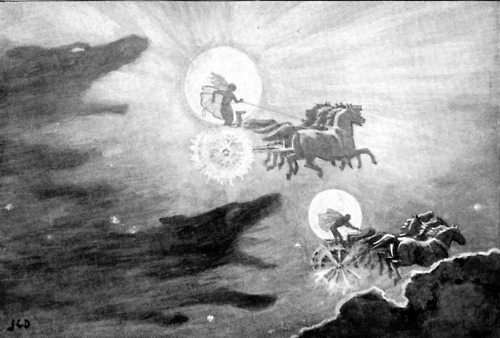
[PREVIOUS][MAIN][NEXT]
[HOME]